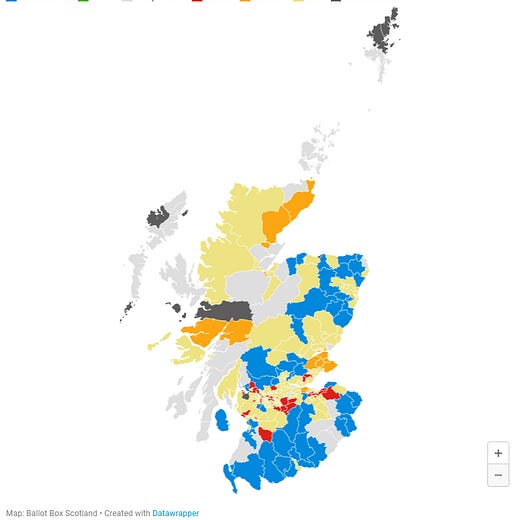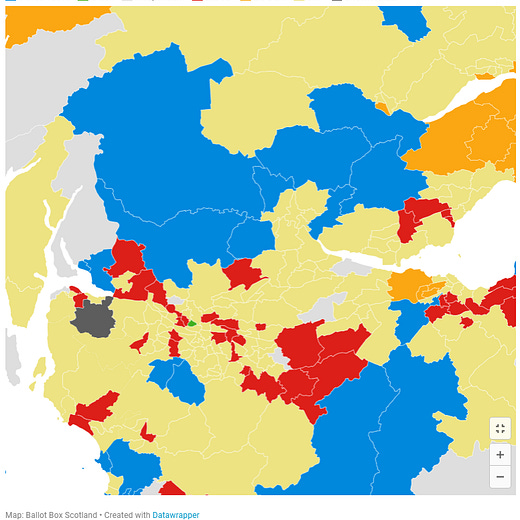Avoiding hyperbole - some thoughts on the Scottish council elections
Stasis around the constitution prevails, as does SNP dominance
Here are some things this newsletter is not interested in: selfies with politicians; party political spin; upholding the cosy political consensus in Scotland; falling in behind the status quo; ignoring difficult truths.
There are many venues where people can get all of these, and similar items, in abundance. Large parts of the Scottish commentariat also provide a kind of flip-flopping analysis based on the latest trends and fads.
Not here. Independence Captured is designed to counter all of that. It is meant to present challenges to the establishment, and to raise questions that don’t get the coverage they deserve.
This analysis of the recent Scottish council elections will be no different. A fully functioning pro-independence press must have the ability to do more than say “this election shows the union is finished, its just a matter of time.”
Because that doesn’t tell the full story of the election, and independence supporters should be armed with a more granular analysis to pick up on some broader themes for interrogation.
As an aside, I’d like to pay special tribute to Roza Salih on her election. I have worked with Roza many times in the past, and she has always fought hard on the issues that really matter. I wish her the best in going forward.
With that said, let’s get to it.
The predictability of Scottish politics
I won’t spend much time on rehashing what’s already available in terms of initial analysis of the election. But I do want to pay a little attention to the ways in which elections have become quite predictable. Here I don’t simply refer to the on-going story of SNP dominance, but to the reaction of parts of the commentariat.
Specifically, there is always a spike in chatter about independence, and in some cases the inevitability of independence. Then, some weeks pass, and the conversation resets. It really is a well trodden path, and increasingly banal. I remember in 2014 meeting people all over Scotland at public meetings who would tell me that there was no way we were going to lose, confidently predicting 65% and above for Yes. That kind of blind faith is never helpful.
Yet it is worth remembering that the SNP election broadcast for this election didn't mention independence at all. Nor did referendum legislation come before the Scottish Parliament on the run up to May 5th to mobilise the SNP base. Indeed, “independence” was fairly low-key at this election in general. Now, perhaps that is in the nature of local elections, but that only underlines the need to take a balanced approach to the real meaning of the outcome.
There is a brilliant research paper recently published which goes into stunning detail about the role of the national question in the 2021 election. It shows there is little doubt about the permanent utility of hegemonising the pro-independence vote. Indeed, as I have argued, this is key to the SNP’s electoral success and not something they are likely to want to let go of.
The trick is to keep the question on the boil without it overflowing. Here there is a lot of space for manoeuvre and little sign that lack of progress around independence is damaging the SNP vote.
Imagine you are an SNP special advisor reflecting on the council elections. You might well be saying, “look, we soft peddled independence, and we still made gains.” In truth, the SNP didn’t just soft peddle independence. Noise around policy as a whole was hardly deafening.
In this context it is useful to look at some polling conducted by the TUC around how people ranked their concerns, and how this played into the SNP approach to the election:
Another poll conducted on the run up to the election found that less than a third of respondents were in favour of a referendum next year. It was conducted by a pro-Union outfit, which I understand will be provocative to readers of this newsletter. But it is far better to develop critical discussions around these matters and to build into our conversations a degree of political objectivity to assess the terrain from a variety of sources.
The Times found support for an independence referendum as follows: 24% favour one within the next 12 months, 31% back one in the next two to five and 45% of those polled said that a fresh vote should not be held in the next few years.
Indeed, one poll published in the week before the election revealed that barely half of SNP voters (57%) thought their leader’s timetable was realistic, with 37% suggesting it was unlikely, and 12% stating it was “very unlikely”.
Meanwhile a poll which put the question of independence as Remain/Leave (something that we really can’t rule out in the future especially as the Electoral Commission may become politically compromised) found the following result:
It would be easy to write a newsletter that acted as an uncritical cheerleader. But in politics, as I have learned to my own cost, it is vital to have as grounded an analysis as possible and to challenge our own biases and expectations. From there a strategy can be developed. This is the kind of information independence supporters need to look at, interpret and understand.
But it also helps us to reveal the real political machinations going on behind an SNP public relations operation that is so often based on polling trends. In this regard you can see how the kind of data above contoured the SNP approach to the council elections and why they decided to focus exclusively on the reviled Tories.
From a purely electoral perspective this appears to have done the job.
Independence: Without a plan - constitutional stasis persists
From a broader independence perspective there is a more complex set of dynamics at play. Yes, we saw impressive gains for the SNP. But the picture is more differentiated than the headlines might suggest.
There are, undoubtedly, cracks emerging in places like Glasgow where the SNP share of the vote decreased in key areas and where Labour just missed out on first place by a margin of one seat. At the same time, parties who oppose independence won more first preference votes than the pro-independence block combined:
This is where I take issue with the recycled columns that argue independence is knocking on the door. From my perspective, I think this only feeds complacency on the one hand, and subordination to the SNP leadership on the other. Unsurprisingly, this newsletter is in favour of neither.
Yes, without doubt, we see a dominant SNP which is an apparently unassailable electoral force. In addition, the Scottish Greens have added handsomely to their tally of councillors. But there is little indication from the results overall that suggests a major shifting of the dial on independence. This despite the antics in Westminster which saturated the airwaves in the months running up to the election.
In an interview with The National the day before the election the First Minister made the following statement:
“Scotland’s on a path to independence but as I’ve always said – and I know it’s tough for people who are like me impatient for Scotland to become independent – we’ve got to do it properly, we’ve got to persuade people, we’ve got recognise the issues that matter to people and make that case relevant and compelling for them.”
The problem is there has not been a consistently made case for independence on its own terms, allied to a vision for real change, to persuade people with. There has not been evidence of a high level of political will to prosecute a major independence drive backed up with a workable prospectus. Indeed there is a lack of intellectual coherence that tends towards fragmenting, rather than galvanising, issues like the cost of living crisis into a strong independence pitch.
How do you persuade people who are skeptical without answers to questions around currency, borders, EU membership and setting up Scottish institutions? How do you enthuse people if your case, which Andrew Wilson has recently repeated, rests on keeping economic power with the City of London, opening Scotland up to a privatisation bonanza and austerity? Since the prospectus has been so confused, for so long, it undermines the notion that there is real political energy behind it.
Thus the polls on independence remain relatively static, with “No” in the lead more often than not. It follows, given this work has stalled since 2014, that the SNP have not had the capacity to take a fully fledged case for independence into any election, whether that be at national or local level.
Indeed, while the 2021 manifesto delivers a mandate for a referendum, the First Minister herself said on the eve of the Holyrood elections that the vote was not about independence. And it is notable that only after the council elections do we hear about a “refreshed case” for independence in the works.
Despite the lack of urgency and planning, the SNP is under less pressure to deliver a pro-independence vote in a referendum by the end of next year than many in Scottish politics assume. If anything, the council elections will assure the SNP leadership that they have the right approach and reinforce cautious instincts in an increasingly complex world.
We are indeed to expect some new policy papers around independence in the coming months. These will, of course, be analysed in detail here at Independence Captured. But there is now a well established pattern: elections come and go, the SNP remain dominant, and independence is hinted at rather than driven forward. In truth, nothing much changes.
All of this is absolutely logical and sensible from the point of view of the SNP HQ, whose primary focus is to secure victories at elections.
Alienation from official politics
My last comment about this election refers to another under discussed feature. Turnout:
I remember in 2012 being involved in building a strategy to reach out to people who were not on the electoral roll and to carry out a mass campaign of voter registration. In the years that followed our stalls were inundated in wards where turnouts where turnouts were traditionally very low.
People felt that they had something to vote for, and that finally that their vote could really change something at a fundamental level. In the run up to the referendum in September 2014 I was asked by the Guardian about the ground work we were putting in around non-voters. In response I argued:
“These are people who are not apathetic but are alienated from the political process.”
Fast forward to 2022 and the same can be said. It is not apathy that keeps people from voting, but alienation. It is the sense that official politics has failed, and that the institutions won’t ever change that breeds a sense of despair. It is the feeling that ones interests will fail to be properly represented and that the powerful will do as they wish anyway, without democratic recourse, that feeds disillusionment.
Not a single ward in Glasgow recorded more than half of the electorate going out to vote. Yes, council elections are known for low turnouts. But this does not mean the issue should be brushed under the carpet.
Scotland can come alive again. But only if deference to the Scottish, as well as the British, status quo is shaken off.






pedagogy of the oppressed (frere) directly addresses the question of alienation/lack of agency as a feature/result/intention of 'dominated consciousness' - 'dominated consciousness is therefore not a synonym but an illumination or development of the static notion of 'alienation, which is more in the way of a description and not a prescription - just saying if tactics/actions are in question...